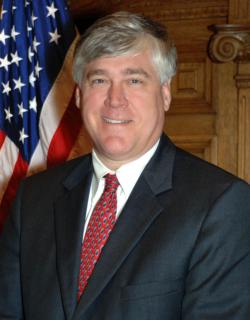Emboldened by Deborah Gonzalez and Jonathan Wallace’s victories in a special election last year that flipped local House seats long held by Republicans, Democrats are taking on another long-unchallenged seat as Democratic candidate Marisue Hilliard vies with state Sen. Bill Cowsert (R-Athens).
Hilliard’s candidacy represents the first time Cowsert has been challenged by a Democrat since 2008, when he won by 16 percentage points. (A fellow Republican ran against him in 2016, losing three-to-one.) Once a coin flip, Republicans reshaped Senate District 46 in 2006, removing a portion of heavily Democratic Clarke County and replacing it with a portion of heavily Republican Walton County.
Green Party member John Fortuin, a tech worker with 20 years of computer programming experience, has also thrown his hat into the ring as a write-in candidate.
Hilliard is a graduate of the University of Georgia’s Warnell School of Forestry and worked for her entire professional career with the U.S. Forest Service, at one point overseeing 1.2 million acres of North Carolina’s national forest land, supervising 200 full time employees and managing a $20 million budget.
While she first imagined herself running for office during her 20s as a young activist with the National Organization for Women, her interest began to take shape in the days after the Sandy Hook shooting in late 2012. Shocked by the event, she quickly formed a local chapter of Moms Demand Action for Gun Sense in America, a grassroots national nonprofit that wants to “protect Americans from gun violence.” She become increasingly frustrated by the lack of action at both the state and federal levels to implement common-sense solutions to address gun violence and protect students, and the issue prompted her to seek public office.
The group lobbied hard against the so-called “Campus Carry” act allowing guns on parts of college campuses. Hilliard said in a phone interview that “there was a lot of anger in Athens, particularly among faculty and staff,” when Gov. Nathan Deal reversed his 2016 veto and signed the bill in 2017.
“At the state level, we have prevented laws from going forward, for example keeping a K-12 law to arm teachers” from coming up for a vote, Hilliard continued.
Cowsert initially voted for the Campus Carry bill, but voted against the final version that Deal signed. He has said he reversed his position after being flooded with opposition from constituents—including his wife and daughter.
Hilliard’s platform includes many progressive priorities, including affordable health care for all, quality education and a living wage.
Fortuin agrees with Hilliard’s political platform but focuses on Georgia’s controversial vulnerable electronic voting system. Prompted by concerns he had about the Diebold electronic voting machines, he founded the Defenders of Democracy, a grassroots citizens group whose mission is to “defend the integrity and accountability in elections.”
Although most of these issues are federal rather than state-level, Fortuin is proposing a Green New Deal, in which the U.S. would “gear up our economy on a World War II wartime-style footing to put appropriate renewable energy sources [in place] and get us off fossil fuels.” He went on to describe “bringing our troops back home” and retraining them as solar installers, completely “redirecting the money now being spent on foreign interventions.” He concluded this thought by adding that “the real problem is financing through Wall Street the continued exploration of fossil fuel resources.”

Cowsert.
Cowsert did not respond to requests for comment for this article.
As the beneficiary of a 2006 redistricting scheme that helped him defeat Democrat Jane Kidd 12 years ago, Cowsert inherited his Senate seat from his brother-in-law, Brian Kemp, who left it to make a failed run for agriculture commissioner. He rose to become majority leader, the third-highest-ranking position in the Georgia Senate and second-highest in the GOP caucus.
In a recent candidate forum, Cowsert emphasized bipartisanship and listed public education, rural broadband internet and rural health care as his top three priorities. As achievements, he cited raising teacher pay and a positive climate for businesses.
His record, however, leans more conservative. He has voted against easing medical marijuana rules, adoptions by LGBTQ couples and cash-bail reform, and for cooperating with Immigration and Customs Enforcement, making English the official language of Georgia and the “religious freedom” bill that would protect the rights of evangelical Christians to discriminate against gays and other minorities.
Cowsert also played a role in watering down and ultimately defeating the Hidden Predator Act, which would have extended the statute of limitations to sue child molestors and institutions that covered for them. His law partner, Steven Heath, represented three Athens churches named in a lawsuit against the Boy Scouts of America alleging that it allowed a local scouts and church youth group leader to continue molesting boys for decades. Republicans on the Senate Judicial Committee, including Cowsert, gutted the bill during a closed-door meeting, and the House, which had approved a stronger version unanimously, refused to accept the Senate’s changes.
Cowsert said at a recent forum that he believed the bill would have allowed too much time to pass for the accused to be able to adequately defend themselves.
As one of the half-dozen or so most powerful politicians in Atlanta, Cowsert has a major fundraising edge over his opponents, with nearly $400,000 in his campaign account as of the end of September, according to state campaign finance records. Hilliard has raised about $64,000 and Fortuin $156, including $100 of his own money.
Like what you just read? Support Flagpole by making a donation today. Every dollar you give helps fund our ongoing mission to provide Athens with quality, independent journalism.










